#��아요
Explore tagged Tumblr posts
Text
안녕하세요! Hello!
Welcome to my blog where I translate Cookie Run:Kingdom(쿠키런 킹덤) stories through google or more translators, while also being in the process of learning Korean, to better understand and appreciate the lore from its intended and original context. And also a lot of analysis.
Side blog ran by @chessboredom main @chessb0r3d
Requests closed! 요청이 마감되었습니다
Feel free to send an ask on which character's lines or specific story I should post translations for from Korean to English. :)
#crk kr translated - translation posts.
#whining - what it says.
#announcemence - posts about correcting my translation posts.
#☆learn korean! - words! (and grammar! ヽ(;▽;)ノ )
Find out what kind of formality a character is using in their lines with this as a guide.
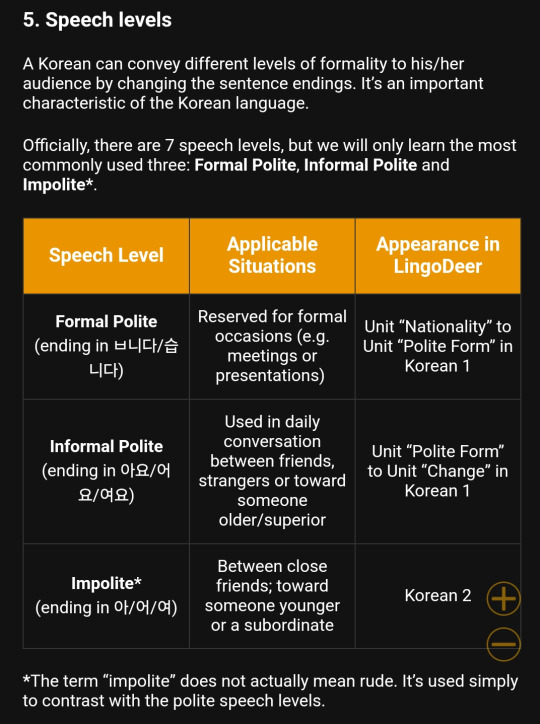
How to read/pronounce/listen to this.
Formal Polite
ㅂ니다 - (-b-ni-da) 슴니다 - (seum-ni-da)
Informal Polite
아요 - (a-yo) 이요 - (i-yo) 여요 - (yeo-yo)
Impolite
아 - (a) 어 - (eo) 여 - (yeo)
I've added a couple of sources where to get pdfs to learn Korean under the cut. :3c
Hangul (Korean Alphabet).
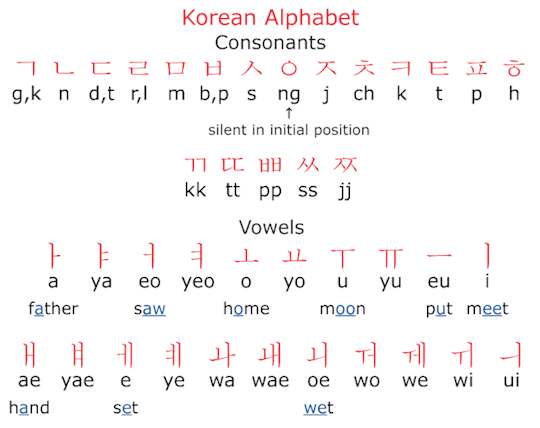
Korean Alphabet: How to Read, Write, and Pronounce for Beginners(2015)
Free documents.
Basic Korean: A Grammar and Workbook
Printable Korean Worksheets
Grammars for Beginners(2019)
Grammar with Examples for Beginners
Korean Grammar – A Beginner’s Guide
Learn Korean Online
#crk kr translated#im filipino if anyone is wondering#how funny would it be for me to translate stuff into filipino? on my kr to en blog?
101 notes
·
View notes
Text
240126 [MONSTAX_IM] Talk Tok Update
안녕 내 낭만 많은 사랑과 축하를 받고 26일이 끝나갈 때쯤 글을 올려요. 여러분은 오늘 하루 어땠나요 어떤 하루를 보냈나요, 어떻게 지냈나요 요즘 날도 많이 춥고 쌀쌀해서 감기를 걸리진 않았나요 제 생일은 항상 겨울이 활기찰 때라서 날이 많이 추운데 날씨에 반면 오늘을 여러분 덕분에 굉장히 따뜻하게 보낸 거 같 아요. 한 사람을 온 마음을 다해 사랑하고 응원하면 자기 생일도 아닌 데 자기 생일처럼 축하하고 좋아하는 몬베베를 보면서 참 신기 하면서도 너무 감사해요. 이러한 순간이 데뷔하고 나서부터 었지만 단 한순간도 익숙해지지도 당연하게 생각하지도 않아요. 시간이 갈수록 더 소중하고 애틋해지는 거 같습니다. 형들도 군대를 갔지만 축하를 너무 따뜻하게 해줬고 몬베베를 포함한 주변 분들에게 많은 축하를 받아서 따뜻하네요. 유독 몬베베도 멤버도 보고 싶은 사람이 많은 밤이네요. 여러분들에게 제가 주는 큰 사랑이 가장 작은 사랑이었으면 좋 겠습니다. 정말 많이 아껴요. 사랑합니다.
Hello, my romance I receive a lot of love and congratulations and post it by the end of the 26th. How was your day How was your day, how was it It's very cold and chilly these days. Didn't you catch a cold My birthday is always when winter is lively, so it's very cold On the other hand, I think I spent today very warm thanks to you. If you love and support someone with all your heart, it's not your birthday It's amazing to see MONBEBE who celebrate and like it's their birthday I'm so thankful for this moment since our debut It was, but I don't get used to it for a moment or take it for granted. I think it's getting more precious and affectionate as time goes by. The older members went to the army, but they congratulated MONBEBE so warmly It's warm because I received a lot of congratulations from people around me, including those around me. It's a night where MONBEBE and members miss each other a lot. I hope the biggest love that I give to you is the smallest love Here we go. I really save a lot. I love you.
♡ Translation: dailykyun. Please take out with full credit.
58 notes
·
View notes
Note
Hi there, i have recently started learning korean and i am struggling with learning present tense because i am so confused about its endings, like i know that there are
ㅂ니다/습니다
아요/어요/여요(해요)
아/어/해
but recently in a lot of pages i saw them writing present sentebces like
to feel-느끼다
they didn't write
느낍니다
느껴요
느겨
but they wrote
느낀다
and also i have seen 먹는다
as far as i understood the edndg is ㄴ/은/는 but what grammar is this as present tense ending because google translate translates a lot of sentences lik this.
Hello! Thanks for your patience. First, I'd like to share my full-length lessons about each of these grammar points that I think can help you:
-ㅂ/습니다 & -아/어/여요
아/어/여
-는/ㄴ다
In short, all four forms you mentioned are different kinds of present-tense conjugations. Here are some brief explanations of each (you can check out the lessons for sample sentences!):
-ㅂ/습니다
I believe the technical term for this form is "formally polite." This form is not used super often--in everyday conversation, it's usually used in set phrases like 감사합니다 or 제 이름은 [your name]입니다. Otherwise, you'll hear it on TV broadcasts and in other very formal situations according to Wikipedia.
-아/어/여요
Wikipedia calls this "casually polite." This, based on my studies and experience in Korea, is the form you'll use most often in spoken conversation. It's not super formal, but it's polite, so you can use it when speaking to employees in a store or other strangers, as well as those you're more familiar with but who are older than you.
A note about conjugation, this form includes the -해요 form! Check out my lesson for more about how to actually conjugate the verbs.
-아/어/여
This is "casually impolite." You might know it in Korean as 반말, meaning "casual speech." This is the form you use when talking with close friends, those your age, and those younger than you. You'll likely need permission from the person you're talking with before using this form.
-는/ㄴ다
This is called the narrative form. You do hear it occasionally in spoken Korean, but its main purpose is for written Korean. This is the form you see in books and other written contexts. It doesn't have a formality level as a result.
However, you might hear this when people talk to one another. Sometimes it's used when people are talking to themselves or just making a statement not directedat anybody in particular and not exactly expecting a response. Check out my full lesson to see examples!
I hope this all makes sense! Thanks so much for the question! 화이팅!
37 notes
·
View notes
Text
Korean verbs and adjectives that end in “ㅡ”
(like 크다, 예쁘다, 바쁘다) follow specific conjugation rules when adding endings.
Here’s how they change depending on the ending being attached:
1. When adding -아/어요 (Present Tense, Informal Polite)
The rule:
• Look at the vowel in the second-to-last syllable.
• If it has ㅏ or ㅗ, add -아요
• If it has any other vowel, add -어요
• Drop ㅡ when adding the ending.
• Exception: If there is no second vowel (like in 크다), just attach -어요 for natural pronunciation.
Examples:
• 크다 (to be big) → No second vowel, so attach -어요 → 커요
• 바쁘다 (to be busy) → second-to-last vowel is ㅏ → 바빠요
• 예쁘다 (to be pretty) → second-to-last vowel is ㅣ → 예뻐요
2. When adding -았/었어요 (Past Tense, Informal Polite)
Same rule:
• Drop ㅡ and look at the second-to-last vowel to decide between -았어요 (ㅏ/ㅗ) or -었어요 (other vowels).
• If there is no second vowel (like in 크다), use -었어요 for natural pronunciation.
Examples:
• 크다 → 컸어요
• 바쁘다 → 바빴어요
• 예쁘다 → 예뻤어요
3. When adding -을 거예요 (Future Tense, Informal Polite)
• ㅡ doesn’t change anything here! Just add -을 거예요 after the verb stem.
Examples:
• 크다 → 클 거예요
• 바쁘다 → 바쁠 거예요
• 예쁘다 → 예쁠 거예요
4. When making Adjective Forms (-은/는)
• Most ㅡ-ending adjectives change ㅡ to 은
• But 바쁘다 and 예쁘다 follow the 르-irregular rule, so they change differently!
Examples:
• 크다 → 큰 집 (a big house)
• 바쁘다 → 바쁜 사람 (a busy person)
• 예쁘다 → 예쁜 꽃 (a pretty flower)
#study chatgpt#korean language#korean verb conjugation#korean learner#korean learning#EPS TOPIK#TOPIK 1#self study#studyblr#info sharing#study sharing
2 notes
·
View notes
Text
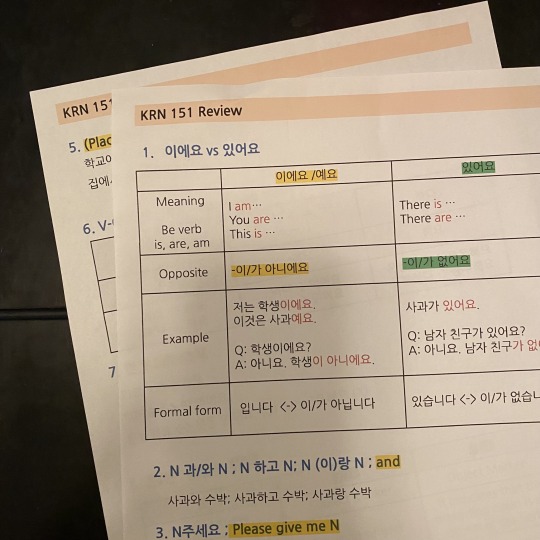
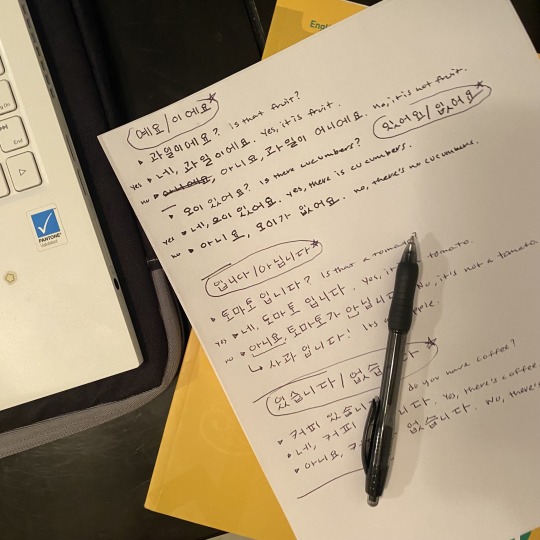
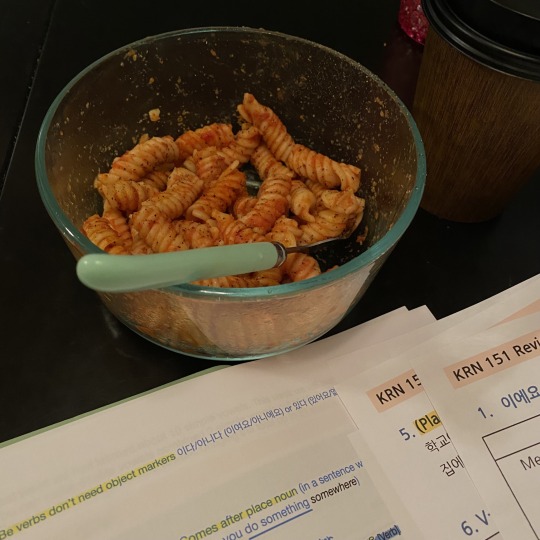

12/5/2023 — 안녕하세요? 내일, 저는 시험이 있어요. 📝📆
I basically spent just a couple hours reviewing all the concepts from the quarter from Hangul to verb conjugations. With every concept, like 이에요/예요, I wrote a couple sentences practicing the concept while also using some of our vocabulary.
Here are all the major concepts that will be on the test:
⭐️ 이에요/예요 and 이(C)/가(V) 아니에요
⭐️ 있어요 and 이(C)/가(V) 없어요
⭐️ 입니다 & 이(C)/가(V) 아닙니다
⭐️ 있습니다 & 이(C)/가(V) 없습니다
⭐️ 하고 & 과(C)/와(V) & 이랑(C)/랑(V)
⭐️ ~주세요
⭐️ �� (이것은/이건) & 그 (그것은/그건) & 저 (저것은/저건)
⭐️ ~에서
⭐️ 아요/어요 & 해요
⭐️ ~안
⭐️ 은(C)/는(V) & 이(C)/가(V) & 을(C)/를(V)
In other words, pray for me.
#college student#korean language#studying#studyblr#language student#language study#studying at home#online student#college life#university student#college finals#korean final#finals#finals week#final test#final exam
10 notes
·
View notes
Text

아요``ㅡ
17 notes
·
View notes
Text

곰이 귀여워요 ₊˚⊹♡🧸ྀི♡‧₊˚
A bear is cute
귀엽다 (cute) is an irregular adjective in Korean language.
Using -아요/어요 form, "ㅂ" disappears and "우" is added instead.
First, we drop -다, then:
귀여 + 우 -------> "우" we always connect with -어요
귀여 + 우 + -어요 ------> 귀여워요
(the last syllable in stem of the verb/adjective if has a vowel 아 or 오, we use -아요 form and in other cases we use -어요)
We have so many irregular adjectives/verbs with "ㅂ".
Here's some examples:
무섭다 - to be scary
가볍다 - to be light (weight of an object)
무겁다 - to be heavy (weight of an object)
덥다 - to be hot (weather)
춥다 - to be cold (weather)
차갑다 - to be cold (describing an object that is cold when touched)
뜨겁다 - to be hot (describing an object that is hot when touched)
**Besides that, we have to be wary of:
the verb 돕다 (to help someone) and adjective 곱다 (to be pretty)
They are irregular as well but it is conjugated differently.
Instead of adding "우", we add "오":
돕다 ------> we drop -다, and we add 오 ("오" connects with -아요)
도 + 오 + -아요 -------> 도와요
But be careful, not every verb/adjective that has "ㅂ" in a stem, conjugates irregularly. Check it out:
좁다 - to be narrow (좁아요) 조워요
입다 - to dress (입어요) 이워요
잡다 - to catch (잡아요) 자워요
#cute art#digital aritst#kawaiicore#cute animals#artists on tumblr#art#cute chibi#chibi art#learn korean#korean language#korean words#korean grammar#한국어 공부하기#korean#south korea#kpop love#kpop#cute#kawaii#kawaii aesthetic
6 notes
·
View notes
Text
어제는 주님의 인도하심과 강력크한 임재하심으로 각각 두시간짜리 설교를 압축해서 무사히 잘 마쳤습니다
늘 드는 생각이 목사님이 주일날 전하는 말씀이 그녕 단편적인 말씀이 아니라 뭔가 개연성이 있다고 생각하고 있었는데 직접 말씀을 전해보니까 그게 맞더라구요
주일날 내 입을 통해 전하시는.말씀을 잘 전하고 나면 드는 생각은 ..
이번주일 전할 말씀은 무엇을 주실까..? 🤔 하는.생각이죠
하지만 그또한 걱정할것 없습니다
주님이 새벽부터 일깨워 말씀 하십니다 ( 새벽에 잠 설쳤다는 말씀 .. 들들들들 멸치도 아니구만 볶으시는 " 야 자냐..? 지금 자게..? 야.. 얌마.".)
그리고 아침에 일어나서 혹시라도 까먹을 까봐 또 말씀하십니다
" 야 기억 있을때 얼른 적지 그래..? 우리 몸으로 직접 체험하며 깨닳을까..? "
아요..? 네버 절대 아니쥬 .. ^ ^ ;;
그냥 말씀만 하셔도 충분하고 차고 넘칩니다 ㅎㅎㅎ
그래서 오늘도 이번주 말씀을 받았으니 한주간 그.말씀을 묵상하고 또 묵상하는 복된 주간이 될즐 믿습니돠
눈앞에 내 현실이 중요한게 아닌 아버지의 꿈과 비젼이 중요한 삶 순종하는 삶 되시길 기원합니다 🤗
#광명전통시장 #광명시장 #전통시장 #���천맛집 #광명왕족발 #광명할머니왕족발 은 #광명소셜상점 #광명8경 #광명동굴 #광명시 #LocalGuides 와 함께 합니다

3 notes
·
View notes
Text
2024.04.15 🇰🇷 - 입니다 / 입니까 vs. -요/요? When talking to strangers? Use 요.
0 notes
Text
instasexual 만족스러운 것만 모았습니다
음란마귀씌인, instasexual 정말 다 있다, 남자와, instasexual 즐기는 모습들을 기대해도 좋을듯instasexual 바로가기: bit.ly/3MBOKbm제 양심이 용납하지 않습니다. 양심이라.... 가만히 턱을 쓰다듬는 이룡. instasexual 그때까지 가만히 있던 사룡이 경훈을 똑바로 주시한 채 입을 열었다. 우리는 아직 자네가 필요하네만... 제 마음이 움직이지 않습니다. 잠시간의 여유를 가지고 다시 생각해보는 것이 어떤가? 오룡이 던진 말로 인해 다섯 늙은이 모두가 이제 한 번씩은 입을 열게 되었다. 예전에도 그랬지만 므로, 줄였습니다. 게다가 그걸 더 자세하게 쓰다간 도대체 얼마나 instasexual 길어질 지 모르는 내용이기에. 그러면 머리아프잖 아요. (어색한 웃음) 극중…
View On WordPress
#남녀채팅#랜덤채팅#무료채팅#instasexual#실시간채팅#심심할때채팅#어색한채팅#온라인채팅#인터넷채팅#재미있는채팅#채팅#채팅문화#채팅방#채팅사이트#채팅스타그램#채팅하는남자#채팅하는여자#채팅어플#채팅커뮤니티#친구만들기
0 notes
Text
무근본 망해라! 버릇없는 내딸서영이씨 [2023.04.03]

⭐︎튤립 : 새로운 사업 구상을 하고 있다고 들었어요.
💕서영 : 어제 '슈퍼카 타는 사람 인터뷰' 한국 버전을 봤거든요. 포르쉐 타이칸을 사는 게 버킷리스트 중에 하나에요. 회사원으로는 그 차 살 수가 없다고 해서 퇴직금을 계산해보니 3~4년 더 근무한 다음에 30대 중반 되기 전에는 가게를 차려야겠다고 생각했어요.
⭐︎튤립 : 어떤 사업인가요?
💕서영 : 술집이에요. 술도 좋아하고 요리하는 것도 좋아하니까 안주를 다양하게 하고 싶고요.. 요즘 원테이블 식당이나 오마카세도 먹으러 다니고, 많이 만들어 먹어 보고 있어요.
⭐︎튤립 : 엄청난 단골 중 하나인데, 무근본을 어떻게 알게 됐는지?
💕서영 : 혜화에서 6년을 살았어요. 같은 동네 주민인 언니가 있었는데요. 제가 성수로 이사를 오면서 그 언니를 어떻게 성수까지 끌어올까 생각했어요. 그 언니는 본인이 아는 곳이 아니면 안 가는 스타일이에요. 획기적인 장소를 찾아야겠다고 작정하고 찾다보니까 여기가 나온거에요.
⭐︎튤립 : 좋아진 계기도 있었나요?
💕서영 : DJ헬창 (구 DJ DJ)이죠! 제 생일파티에도 개인적으로 그 분을 섭외했을 정도로 완전 좋아요. 언젠가부터 주말에만 나오시니까 저도 잠깐 뜸하다가. 두홍이나 수빈이나 다른 사람들도 등장하고 하면서 새로운 재미를 찾으니까 다시 자주 오게 된 것 같아요.
⭐︎튤립 : 무근본과 관련된 인상깊은 에피소드가 있는지.
💕서영 : 송강 닮은 알바가 있다고 소문이 나서 친구들을 많이 꼬셔서 간 적이 있어요. 그 날 경우없이 술을 많이 먹어서.. 여기 센트럴파크(구 센트럴파크 현 중앙정부)에서 간이테이블에서 마셨는데 제가 너무 취해가지고.. 의자가 달그락거려서 무너지고 하면서 맥주랑 잔이랑 다 깼거든요..
근데 그 때.. 송강 닮은 알바 분이.. 그 광경을 보면서 그 잘생긴 얼굴로..
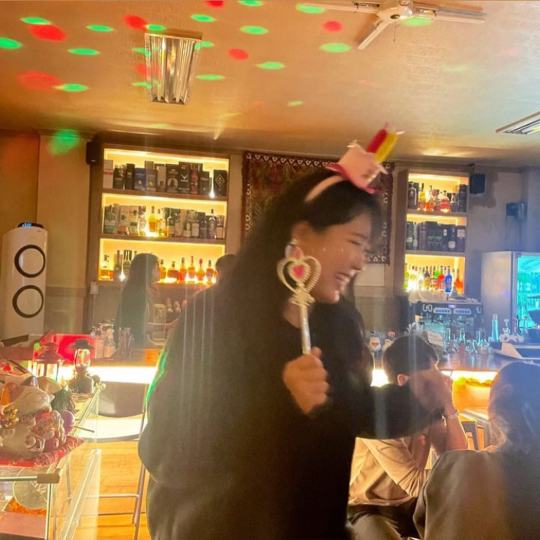
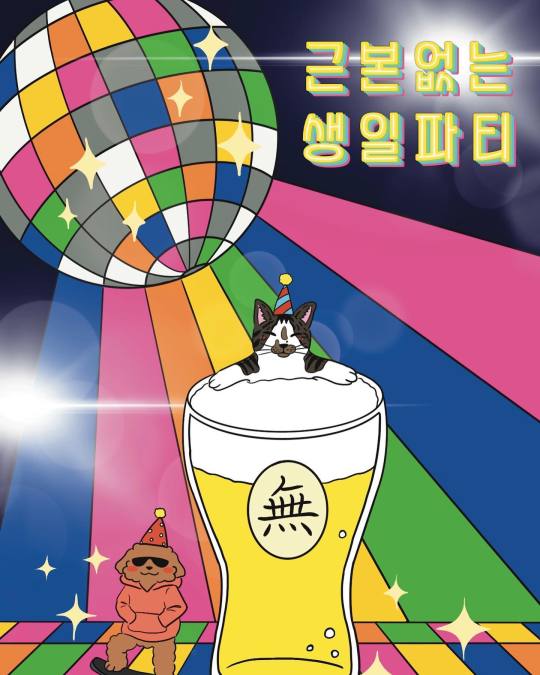

(서영 회상) 친구가 한쪽 팔을 풍차처럼 휘둘렀고.. -_-
손에 들려있던 맥주 병은.. 내 머리를 강타하며..
와장창 무참히 떨어졌다..
.........아프다......... ㅜ^ㅜ
"어떠헤!! 어떠헤 !!"
요란스런 직원들과 칭구들의 목소리.
"괜찮...아요.. ㅜ^ㅜ.."
"고개좀 들어보세요.."
"아뇨.정말 괜찮아요...ㅜ_ㅜ..."
그때 무릎위로 떨어진 내 눈물...맥주병에 맞아서 우는거 아닌데.ㅜ^ㅜ
아까부터 울고있던건데.......ㅜ_ㅜ.정말인데.......ㅜ_ㅜ
"울지말고요!!!!!!!!!많이 아퍼요!?!?"
"아니라니까요!왜그르세요 ㅜ^ㅜ"
송강이랑 내가 실갱이를 하는사이..그 놈의 얼굴이 내 눈 앞에 다다라 있
었다.-_- 비러머글 송강놈-_-아.>_<내가 지금 무슨말을>_<
"아.. 예쁘다.. ^-^...."
-0-....
......
.....
.................................손에 들고 있던 담배를 튕겨버리는 송강..
........
"........................서영씨........"
"................강아.........................."
난 송강에게 가까이 다가가..... 그 애 옷깃을 저며주었다..
................
................................
그 애 옷에서.. 옅게 번지는 담배와 섞인 맑은 향수 냄새........
픽 웃는 송강.. ........
................
................................
........................
- 0 - !!!!!!!!!!!!!!!!!1
송강의 입과 내 입이 맞닿으려는..... 순간...
나는 죽기 아니면 까무러치기로 벌떡 일어나.
주먹으로 그 앨 팼따... 한 대.. 두대... 발로 까고 뺨 후려치고
걔 몸을 여기저기 퍽퍽 때렸따.
걔는 피를 토하면서 거의 죽을 지경이 됐다.
200대는 때린 것 같앗다.
"퉤"
💕서영 : 그 잘생긴 얼굴로 이게 뭐지 하는 표정을 지었던 게 지금도 잊혀지지가 않아요. 그리고 나는 기억을 잃었어요. 그게 내가 기억하는 마지막 순간이었어요.
⭐︎튤립 : 너무 좋아하는 남자한테 추한 모습을 보여서요?
💕서영 : 아니에요. 오히려 잘생긴 사람은 별로 안 좋아해요. 그리고 특히 뒤틀린 욕망이 있어요. 잘생긴 남자는 패야 해요. 특히 본인이 잘생긴 걸 알고 행동하는 사람들이요.

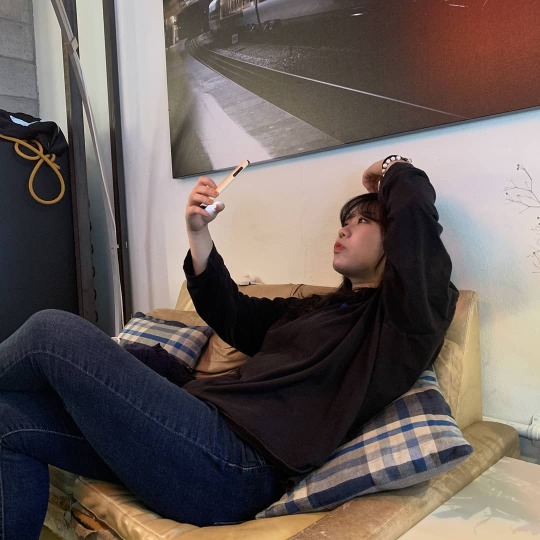
⭐︎튤립 : 그렇지만 잘생긴 남자들을 자주 데려오던데요.
💕서영 : 사람들이 오해를 하는데 친구가 많은 거예요. 그냥 원래 알던 친구들. 모집단이 많으면 가능성이 올라가잖아요.
⭐︎튤립 : 성균관대생이라는 게 의외에요. 술고래 손님 이미지이다보니.. 대학생활은 어땠는지요?
💕서영 : 강의가 있으면 전날에 학교를 미리 가있어야 했어요. 3보에 한사람씩 인사를 해야 해서 수업을 들을 수가 없었죠. 6년을 다니고 졸업했는데 학생회 활동을 너무 열심히 했어요. 사회과학대에서 신서영을 모르면 사회과학대 학생이 아니라는 말이 돌 정도로. 새로 생긴 술집에는 제가 메뉴를 만들어줘서 그 가게의 시그니처가 되곤 했어요.. 그 때는 그 뽕에 취해 살았죠!
⭐︎튤립 : 무근본에서 생일파티로 대관을 했는데 무려 친구들을 60명을 데려왔잖아요?
💕서영 :사회인으로서는 처음 했던 파티였어요. 미숙한 부분도 많았고 무근본 입장에서도 처음 하는 통대관이었던 걸로 알아요. 사장님이 너무 고마웠고 저를 위해 신경을 많이 써주셔서 그 이후로도 무근본의 개처럼 충성을 바치고 있는 거지요. 재작년 크리스마스에도 대관해서 파티를 한 적이 있는데요. 동생이 공주교대를 다녀서 충남 공주시 신관동에 <이야기 가게>라고 3층의 작은 바를 빌려서 했어요. 거기서 라자냐 만들어 팔고 포스터도 만들고, 수익도 가져가고. 그랬었죠.
⭐︎튤립 : 유튜브도 하고 계시잖아요. 홍보 한 번 해주세요.
💕서영 :100명 유튜버예요. 인기 동영상은 500명 넘게 봤어요 ^^ 내가 소소하게 만들고 취미 삼아서 하는 것들을 올리고 있습니다.. <맛있서영> 많이많이 구독해주세요~

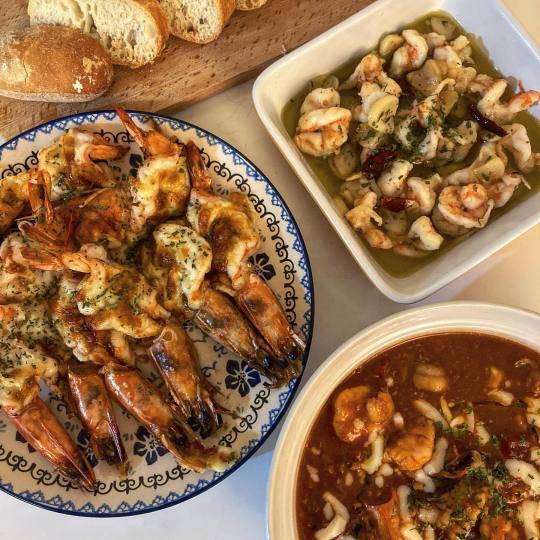

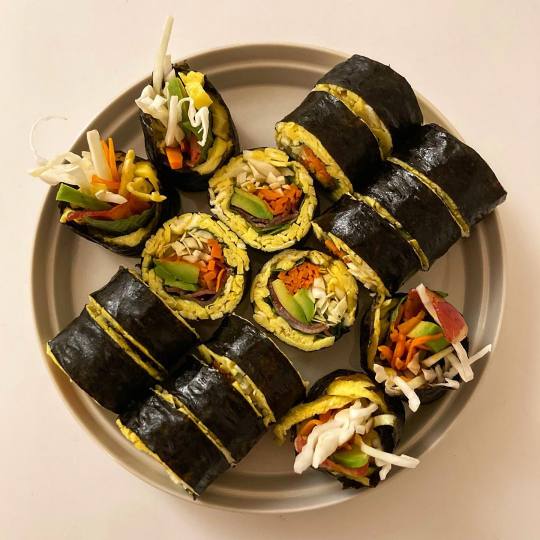
⭐︎튤립 : 지금 일하는 회사와 분야는?
💕서영 : 외국계 출판사 마케팅 분야에서 일하고 있어요. 아동 청소년 학과를 나왔고 소비자 가족학과를 복전했어요. 예전에 영어학원에서 알바했을 때 사람들이 저를 좋게 봐줘서, 졸업하고 정규 강사로 2년 정도 근무했어요. 그때 가르칠 때 썼던 교재가 지금 출판사에서 나온 교재라서요. 그런 걸 자소서에 잘 써서 붙어서 다니게 됐어요.
⭐︎튤립 : 인생차는 왜 굳이 타이칸인가요?
💕서영 : 전기차잖아요. 유망한 것도 같고, 약간 환경 쪽에도 관심이 있어서요. 석유같은 자원은 한정되어 있고 공기도 오염시키고요.
⭐︎튤립 : 그럼 비건쪽에도 관심있는지.
💕서영 : 고기를 너무 사랑하기때문에 아니에요.
⭐︎튤립 : 물질적인 성���에 대한 욕망이 있는지.
💕서영 : 확실히 말하면 돈은 많이 벌고 싶어요. 근데 워라밸도 중요해서 사업하고 싶어요. 처음엔 안그렇겠지만 나중에 자리가 잡히면 편해지잖아요. 장기적으로 보는 것도 있고.
⭐︎튤립 : 순대왕 장용삼처럼 스포츠 토토라던지 투자같은 건 안하나요?
💕서영 : 투자, 주식 등은 원금 보장이 안 되잖아요. 성격 자체가 정직하게 돈 버는 스타일이고 인생이 좀 요행을 바라지 않는 스타일이에요. 그나마 열심히 했던 도박은 인형뽑기 딱 하나에요. 그걸로 대학 다닐 때 재테크 좀 했어요. 여자애들이 좋아하는 피카츄나 쿠로미 이런 것들 있죠. 남들이 만 원으로 뽑을 거 3천���이면 뽑고 해서 이득을 많이 봤어요.
⭐︎튤립 : 좋아하는 음악, 영화 등이 궁금합니다.
💕서영 : 올드팝을 좋아해요. 유치원 놀이방에서 퀸 노래 듣고 그랬어요. 아빠도 어렸을 때부터 차에서 8090년대 노래를 많이 틀어줬어요. 영어에 관심을 갖게 된 것도 그 이유가 큰 것 같아요. 영화는 솔직히 관심이 없어요. 대신 최근에 올드팝 때문에 같이 좋아진 게 <중경삼림>, <해피투게더>. 각각 California Dreamin’, Happy Together 라는 OST가 있잖아요. 뭔가 왕가위 영화에 많이 스며들었어요.
⭐︎튤립 : 마지막으로 하고 싶은 말?
💕서영 : 무근본이 요즘 너무 잘 되고 있어요. 뒤안길을 소망하는 1인으로서. 또 너무 뒤안길이면 오래 못 가니까 적당한 뒤안길을 유지해주시면서. 내딸서영이도 신경써주셔서 감사하고 저는 죽을 때까지 오겠습니다.

서영's Favorite
MOVIE / 중경삼림, 해피투게더, 헤어질 결심
MUSIC / QUEEN, California Dreamin'
MBTI / SEXY💕
싫어하는 것 / 삼천포
무근본이 적당히 망했으면 좋겠는 "내딸서영이" 신서영씨입니다~
☞서영씨 인스타그램, 유튜브 바로가기
#잡지#인터뷰#무근본#튤립매거진#털프매거진#매거진#magazine#tulpmagazine#moogeunbon#interview#チューリップマガジン#無根本#雑誌#インタビュー#중경삼림#해피투게더#헤어질 결심#QUEEN
0 notes
Text
A/V STEM{*하}해요 • A/V STEM{*(ㅗ,ㅏ)}아요 • A/V STEM{≠(하,ㅗ,ㅏ)}어요
[...hae·yo] • [...a·yo] • [...eo·yo]
(haeyoche speech) (informal polite)
• (declarative present) ... A/V ...
• (interrogative present) ... A/V ...?
• (imperative present) ... A/V (please) ...
If A/V STEM is from 하다 type ➡ 해요 ending
If A/V STEM ends with ㅗ or ㅏ ➡ 아요 ending
Else ➡ 어요 ending
Haeche speech (informal non-polite): A/V STEM(해/아/어) [...·(hae/a/eo)]
🔗 Speech Levels
🔗 Haeche Present & Haeyoche Present
#해요#haeyo#아요#ayo#어요#eoyo#theme: 해요체#theme: haeyoche#theme: haeyoche present#theme: informal speech#theme: tenses#theme: 해체#theme: haeche#theme: haeche present#theme: non-honorific haeche present#theme: non-honorific haeyoche present#해#아#어#hae#a#eo
0 notes
Text
*
#한굳어 수업 동안 매번 문장을 표현해햐 할 때 '밀린 일'과 '과제물'을 쓰는 것 같아요#왜냐면 게으르게 지내는 사람이거든요... 항상 밀린 일이 많~아요#그렇게 살고 싶지 않은데 어떻게 하면 바꿀 수 있는지 잘 몰라요#아마도 그냥 멍청해요#네.... 그럴 수도 있겠죠
0 notes
Photo
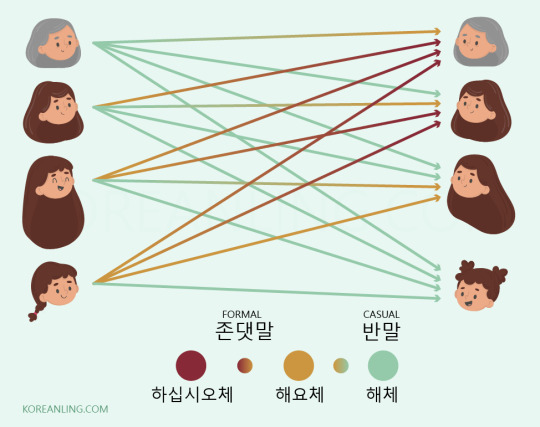
update on my formalities post from long ago with nice art to help you visualize it more~
i wrote in-depth with a breakdown of each age range to really get into it over here with each person separated out but for now here's the quick easy version!
Quick Breakdown of Korean Formalities
존댓말
polite formal
하십시오체
used with people older/above you hierarchically
especially used with clients, business partners, customers, etc. – people to show respect to
used by news broadcasts and reporters
~ㅂ니다
ex; 합니다, 하십니다
polite informal 해요체
most common and safest speech to use; when you don’t know the person/your relationship
tv show hosts use it
more common with younger generations
~아요/여요/어요
ex; 해요, 하세요
반말
impolite formal 해라체
sort of plain text used in magazines, books, newspapers, songs, etc.
~다/ㄴ다/는다
ex; 한다, 하신다
impolite informal 해체
used with friends, family, people of lower status, or younger than you
ex; 해, 하셔
#korean#studyblr#korean studyblr#korean langblr#langblr#korean culture#culture#mine#i started my own site omggg#i wanna get back into korean langblr and researching and everything i had a great time doing it before#so i have a couple things up there rn#honestly i stopped becaus my job at the time was writing bullshit seo blogs and i rrly didnt want to home from writing to write more#but im outta thereee so i feel much better hah
62 notes
·
View notes
Text
230126 [MONSTAX_IM] Talk Tok Update
🫠🖤🐰
28살의 축하를 마지막 한순간까지 받고 지금 이렇 게 글을 남겨요. 항상 무엇이든 함께하면 의미가 생기고 더 해지는 거 같습니다. 2023년의 생일도 몬베베와 함께라서 그 의미가 더 해졌고요.
이번 ��즌 앨범 활동을 하면서 몬베베분들한테 자 주 들었던 소리가 "너 요새 마음이 편해 보여"라고 몇 번 들었는데 실 제로 작년에 비해 마음이 가볍고 몬베베는 그걸 알아차려서 신기했던 거 같 아요.
(역시 mine🫠) 생일 전부터 생일 당일까지 많은 분들이 축하해 주 는 모습을 보는데 물론 제가 축하를 받는 게 기분이 좋지만 그 모든 과정과 그걸 준비하는 몬베베의 마음을 상상하면 서 축하를 받을 수 있어서 더 행복했던 거 같아요.
같이 즐거워하고 또 친구끼리 만나서 축하하고.. (진짜.. 귀여워🤦)
여러분은 정말 소중해요.
2023년 새로운 해가 밝아온 만큼 저도 더 크게 성 장하고 많이 보여드릴 수 있는 기회가 됐으면 좋겠 습니다.
그렇게 만들어 볼게요. 어느 정도의 부담이 없다고 하기는 거짓말이지만 이 또한 있기에 잘해내고 싶은 욕심이 생기네요.
꾹꾹 눌러 담아서 사랑합니다❤️💜
I'm leaving this message after receiving the congratulations of my 28th birthday until the last moment. I think it's more meaningful and more meaningful when we do everything together. My birthday in 2023 is more meaningful because I'm with MONBEBE. I heard this a lot from MONBEBE while promoting "Reason" album. "You look so comfortable these days". Compared to last year, It's light and MONBEBE noticed it, so I think it was amazing. (As expected, mine) 🫠. I saw a lot of people wishing me a happy birthday from before my birthday to the day of my birthday. Of course, I'm happy to be congratulated, but I was even happier to be congratulated while imagining the whole process and MONBEBE preparing for it. Let's have fun together, meet friends, and celebrate. (Really... Cute🤦) You are so precious. As the new year has come in 2023, I hope it will be an opportunity to grow and show you more. I'll make it like that. It's a lie to say that there's no pressure, but because of this, I want to do well. hold on tightly · I love you❤️💜
♡ Translation: dailykyun. Please take out with full credit.
90 notes
·
View notes
Text
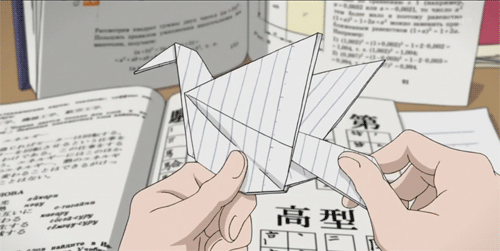
How to conjugate Nouns in Korean
What is a noun?
A noun is a person, a place, or a thing
Person example - 학생 (student)
Place example - 공원 (park)
Thing example - 티비 (tv)
You can’t end a sentence with just a noun, because it would be incomplete.
Ex: 저는 학생 ❌
The verb always goes at the end if a sentence, so in order to make the above sentence complete we must attach a new ending to it.
This ending is 이다 and it means “to be”. This CANT be attached to verbs - only nouns. For example, your name is a noun. (민지다 ~ to be Minji)
You’ve probably seen it In it’s conjugated form: 이에요 / 예요 (Is / Am / Are)
The rule you must remember here is that when the noun ends with a consonant (ㄱㄴㄷㄹㅁㅂㅅㅌㅍㅎㅋㅊㅈㅇ) you will always attach - 이에요.
When the noun ends with a vowel (ㅏㅑㅓㅕㅗㅛㅜㅠㅐㅔㅣㅡ) you will attach - 예요.
Once again these can only be attached to nouns (person, place, thing). Let’s bring back our previous examples:
Person example - 학생 (student)
Place example - 공원 (park)
Thing example - 티비 (tv)
학생 ends with ㅇ(ng) which is a consonant, so we’ll attach 이에요.
학생 (student) + 이다 (to be) = 학생이다 (to be a student) And then once 이다 is conjugated it becomes 이에요.
학생이에요 (Is a student)
Next example is 공원. If we look at the very last letter it’s ㄴ (a consonant) so we'll add 이에요
공원(park) + 이다 (to be) = 공원이다 (to be a park) > 공원이에요 (Is a park)
The last example is 티비 and this one is different from the others. The last letter is 이 (a vowel), so we’ll attach 예요 instead.
티비 (tv) + 다 (to be) = 티비다 (to be a Tv) > 티비예요 (Is a tv.)
Last reminder that 이에요 and 예요 CANNOT be used with verbs.
배우다 (to learn) can not be 배우예요❌ (배우 + 어요 = 배워요)
Neither can you use 아요/어요 on Nouns
물 (water) can not be 물어요❌ (물 + 이에요 = 물이에요)
Conjugating with different formality levels:
Formal is very easy. We just attach 입니다 to nouns, we’ll never use 습니다 when it comes to nouns.
Example:
물이다 > 물이에요 > 물입니다 = It’s water
티비다 > 티비예요 > 티비입니다 = It’s a TV
The informal form is similar to 이에요 and 예요.
When the nouns ends in a vowel ~ 야
When the noun ends in a consonant ~ 이야
Example:
물이에요 > 물입니다 > 물이야 = It’s water
티비예요 > 티비입니다 > 티비야 = It’s a tv
QUESTIONS:
입니까? = formal question ending
이에요/예요? = just raise your intonation
Examples:
가: 무엇입니까? (뭐예요?) = What’s this?
나: 의자입니다. (의자예요.) = It’s a chair
가: 한국 사람입니까? (한국 사람이에요?) = Is she Korean?
나: 네, 한국 사람입니다 (한국 사람이에요.) = Yes, she’s Korean
Practice Section:
conjugate and create sentences with each noun. you can pick one formality level or try to do them all
한국 = Korea
친구 = Friend
가방 = Bag
사과 = Apple
어머니 = Mother
25 notes
·
View notes